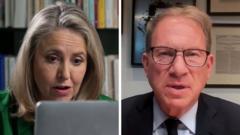Following a serious security breach involving a Signal messaging group chat, journalist Jeffrey Goldberg discusses being targeted by Trump administration officials amid calls for accountability and investigation.**
Journalist Jeffrey Goldberg Speaks Out After Controversial Signal Group Chat Leak**

Journalist Jeffrey Goldberg Speaks Out After Controversial Signal Group Chat Leak**
The Atlantic editor shares his experiences after being mistakenly added to a group chat containing sensitive data from U.S. officials.**
In a dramatic unfolding, journalist Jeffrey Goldberg found himself entangled in a high-stakes scandal after being mistakenly added to a Signal messaging group chat featuring top U.S. national security officials. The Atlantic editor's inadvertent access to sensitive military discussions has positioned him as a target for personal attacks from senior members of the Trump administration, including President Donald Trump and National Security Advisor Michael Waltz.
Goldberg's experience began with a surprising message that he initially thought was a hoax. This message led him to a chat with prominent officials, including Secretary of State Marco Rubio and Secretary of Defense Pete Hegseth, who unknowingly shared critical details about an upcoming military operation in Yemen. During an interview, Goldberg noted the unusual nature of the communication, reflecting on his unexpected role in what felt like a spy fiction narrative, though he mourned the lack of actual intrigue.
As the incident escalated, Waltz publicly took responsibility for the mix-up, stating he had intended to contact someone else and was previously unfamiliar with Goldberg. However, Goldberg pointed out that Waltz had his contact information, raising questions about the error's legitimacy. The controversy surrounding this security slip intensified as Trump officials publicly cast doubt on Goldberg’s credibility. Trump's candid remarks labeled him a "loser" and "sleazebag," while Waltz dismissed concerns regarding the leaking of classified information.
Goldberg’s decision to publish texts from the group chat clarified the extent of sensitive information that had circulated, including specific timing details for military strikes. In light of the pushback from administration representatives, Goldberg felt compelled to present the evidence, especially after claims from officials that no substantive intelligence had been disclosed.
The tension surrounding the fallout highlights broader accountability concerns in the current administration. Goldberg emphasized that, despite fluctuating standards for personnel in high office, the same actions would lead to severe repercussions for lower-ranked military personnel if they mishandled classified information. He shared his decision to exit the group chat, explaining that while curiosity about the ongoing conversation was there, ethical considerations guided his choice.
As this story develops, the implications of this leak continue to resonate, prompting demands for an investigation from both Democratic and some Republican lawmakers as Goldberg stands firm amidst the escalating personal attacks.





















